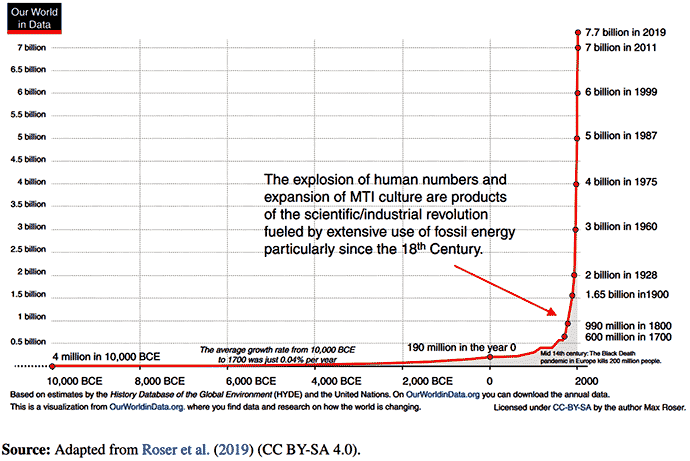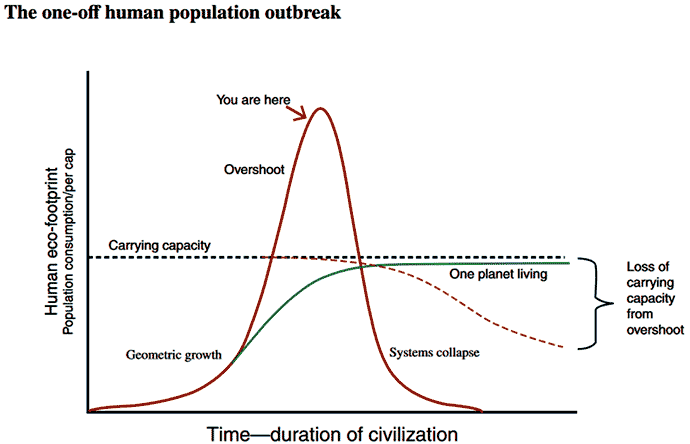Overshoot And The Population Conundrum
We all intuitively know that human population cannot grow forever on a finite planet. Nor can it grow forever within the ecological constraints of a given nation.
William E. Rees is the founder of ecological footprint analysis. His recent paper is The human eco-predicament: Overshoot and the population conundrum, published in the Vienna Yearbook of Population Research 2023 (Vol. 21). The paper is a well-researched discussion of the population conundrum we all face. While academic, it is readable and presents concepts that are often and deliberately ignored by politicians and ruling elites. A few excerpts are included below:
The human enterprise is in overshoot, depleting essential ecosystems faster than they can regenerate and polluting the ecosphere beyond nature’s assimilative capacity. Overshoot is a meta-problem that is the cause of most symptoms of eco-crisis, including climate change, landscape degradation and biodiversity loss. The proximate driver of overshoot is excessive energy and material ‘throughput’ to serve the global economy. Both rising incomes (consumption) and population growth contribute to the growing human eco-footprint, but increasing throughput due to population growth is the larger factor at the margin.... Mainstream approaches to alleviating various symptoms of overshoot merely reinforce the status quo. This is counter-productive, as overshoot is ultimately a terminal condition. The continuity of civilisation will require a cooperative, planned contraction of both the material economy and human populations...
Introduction: Contrasting approaches to population
My thesis in this paper is that modern techno-industrial (MTI) society is in a state of dangerous ecological overshoot—i.e., that there are too many people consuming and polluting too much on a finite planet.... Planet Earth is also an island in space with a limited productive land area, but it is threatened by rampant ecological degradation (including accelerating climate change), continuous conflict over habitable territory, evidence of incipient energy and food shortages... Nonetheless, there are no national or global plans for population management.... In short, the ‘population question’ is still largely a taboo subject... Earth’s population of 7.9 billion people is still growing by more than 1% (80 million people) per year...
Rees shows how rapidly human population has grown since the 1800s.
The growth of human numbers over the past 12,000 years
Rees observes that:
The growing list of so-called ‘environmental problems’ is empirical evidence that we humans are literally depleting and contaminating the biophysical basis of our own existence. We are the problem. The destruction of essential natural capital erodes the functional integrity of the ecosphere and undermines life-support functions vital to human survival. The long-term costs are incalculable. Ecological economist Herman Daly has suggested that overshoot coincides with uneconomic growth; i.e., with growth that impoverishes rather than enriches.... The acceleration of climate change is merely the most popularised single symptom. (Humans tend to think in simplistic, reductionist terms).
Rees then discusses humanity’s competitive displacement of nature, stating that "The increase in human numbers on a finite planet necessarily 'competitively displaces' wild species." He then describes the population factor in overshoot, and how eco-footprint analysis can be used to estimate the degree of overshoot.
He notes that:
Most important, while over-consumption and population growth have long been recognised as co-drivers of overshoot (Ehrlich and Ehrlich, 2014; Ehrlich and Holdren, 1971), population growth is currently the major contributor to total consumption growth and associated negative ecological impacts in all four income categories....
... 'peak population' and subsequent population decline in high-income countries should be cause for celebration. Population growth in the richest nations generates almost an order of magnitude greater demand for biocapacity than an equivalent numerical gain in low-income countries.
Understanding the need for population stabilization - let alone population reduction - is all well and good. But in actuality, mankind has a predilection to ignore long-term problems. Rees explains that:
In the real world, of course, the population is still growing and there is zero international interest in sizing the global economy to fit within carrying capacity.... Perhaps this is to be expected. Despite our much-vaunted high intelligence, H. sapiens is not primarily a rational species. We tend to be foolishly short-sighted and are prone to selfishness... emotions, instinct, cognitive dysfunction and acquired habits—often operating beneath consciousness—dominate personal and political behaviour.... For example, humans share with all other organisms the inherent propensity to expand to fill all accessible habitats and to use up available resources, but with the major difference being that our technological prowess is constantly upgrading the resources that are 'accessible' and 'available'.
Rees explains population overshoot with this graph:
As population growth overshoots ecological carrying capacity, a systems collapse occurs. Carrying capacity is degraded and even less population can be supported.
Rees notes that:
The human population, at present average levels of consumption, exceeds the carrying capacity of the ecosphere and is well into overshoot, as revealed by eco-footprint analysis and myriad other data (solid red line). However, consumption continues to grow, depleting resource stocks and undermining remaining biocapacity. A truly rational species would have maintained its population below carrying capacity (solid green line), consistent with one-planet living... This option is no longer available. As we near peak population, the global community must choose between cooperation to manage a controlled population contraction within the remaining regenerative capacity of the ecosphere (dashed red line) or enduring a violently chaotic systems collapse in which billions will suffer.
Where do we go from here?
Rees concludes that "some form of contraction of the human enterprise is a biophysical necessity if we are to maintain the functional integrity of the ecosphere." He notes that "business as usual" plans won't solve the overshoot - carrying capacity problem. Neither will renewable energy and the Green New Deal, which demonstrate denial and ignorance of systems behavior. Rees observes that:
Humanity's techno-hubris is exceeded only by collective denial and ignorance of systems behaviour.
The as-yet-unacceptable alternative—acknowledging overshoot and recognising that a major reduction of both population and economic throughput (consumption and pollution) is the only way to eliminate it—is barely beginning to take form... The overall goal must be to establish and maintain the necessary conditions for a smaller human family (one to two billion people) to enjoy both economic and ecological security through 'one-planet living'.
Related
Understanding Exponential Growth - a 5 minute interactive tutorial.
Exponential growth, doubling time, and the Rule of 70.
Book: Overshoot: The Ecological Basis of Revolutionary Change, by William H. Catton, 1982. Readable. A definitive reference.
Book: Blip: Humanity's 300 year self-terminating experiment with industrialism,by Christopher O. Clugston, 2019.
Blip: Humanity’s 300 Year Self-Terminating Experiment With Industrialism, by Frosty Wooldridge.
Book: Beyond Growth: The Economics of Sustainable Development, by Herman E. Daily, 1997.
Book: Our Ecological Footprint - Reducing Human Impact on the Earth, by Mathis Wackernagel and William Rees.
Book: Ecological Footprint: Managing Our Biocapacity, by Mathis Wackernagel, 2019.
Environment and Urbanization - Ecological footprints and appropriated carrying capacity: what urban economics leaves out, by William E. Rees, 1992.


